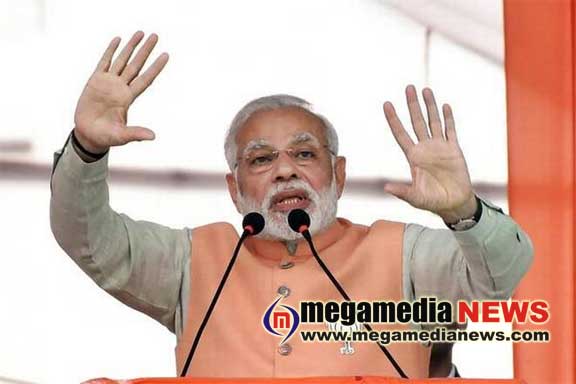Govt, political parties must stay out of judicial crisis: PM Modi
6:11 PM, Monday, January 22nd, 2018 New Delhi: Prime Minister Narendra Modi today said the government and political parties must stay out of the unprecedented judicial crisis, gave enough indications that the upcoming Budget may not be populist and asserted his poll slogan of “Congress-free India” was not aimed at eliminating the party politically.
New Delhi: Prime Minister Narendra Modi today said the government and political parties must stay out of the unprecedented judicial crisis, gave enough indications that the upcoming Budget may not be populist and asserted his poll slogan of “Congress-free India” was not aimed at eliminating the party politically.
In a wide-ranging 75-minute interview to Times Now, Modi also said he is open to more changes in the Goods and Services Tax (GST) to plug loopholes and make it a more efficient tax, six months after the roll-out and dozens of changes. He also said how attempts were made to sabotage the country’s most ambitious tax reform since Independence and attacked those opposing the GST, saying they were “insulting” Parliament.
Asked about the crisis in the Supreme Court after the four seniormost judges came out to openly criticise allocation of sensitive cases by the chief justice, Modi said, “I think I should stay away from this debate. The government must also stay away. The political parties must also keep out of it.”
In his first public remarks on the unprecedented crisis that rocked the Supreme Court since the January 12 press conference by the four judges, the prime minister expressed confidence that the judiciary will sit together to find a solution to its problems.
“Our country’s judiciary has a very bright past, they are very capable people. They will sit together and find a solution to their problems. I have faith in our justice system, they will definitely figure out a solution,” he said.
Modi said his slogan of ‘Congress-free India’ was not about eliminating the main opposition party politically but about ridding the country of the “Congress culture” which he termed as casteist, dynastic, corrupt and involving total control over power among other ills.
Maintaining that the Congress has been the “main pillar” of politics in the country that spread its culture to all political parties, he said his call for “Congress mukt” or ‘Congress-free India’ was “symbolic” and he wants even the Congress to be free of the “Congress culture”.
He also attacked the opposition party for its objection to the triple talaq bill in the Rajya Sabha, saying instead of indulging in vote bank politics it must get out of this “regressive mindset”. Modi wondered if politics has fallen so low that it cannot look at the legislation from the point of view of women’s empowerment.
The prime minister dwelt at length for the first time on his “Congress-mukt Bharat” slogan, which he had coined during his 2014 Lok Sabha election campaign. The slogan became a popular political weapon, after the Congress was reduced to a tally of 44 seats in the Lok Sabha, and subsequently lost power in many states to the BJP.
Asked if his government will turn populist in its last full-year Budget before the general elections in 2019, Modi said the issue falls under the ambit of the finance minister and he does not want to interfere in it. “But those who have seen me as the chief minister (of Gujarat) and also as the prime minister (would know) common man does not want all these things. It is a myth,” he said.
The common man, he said, expects honest governance. “He doesn’t demand sops and freebies. It is our myth.” Modi said his government was taking decisions to fulfill the needs and aspirations of the common man. The prime minister pledged that his government will stay on the course of the reforms agenda that has pulled out India from being among the “fragile five” economies of the world to being a “bright spot”.
Modi stoutly defended his economic policies, saying demonetisation was “a very big success story” and that he was open to changes in the GST to plug loopholes and make it a more efficient ‘one-nation-one-tax’ system.
He rejected criticism of providing a jobless growth, saying “lies” were being spread about employment generation and his government’s policies were oriented towards creating jobs. Acknowledging farm distress, he said it was the responsibility of the Centre and the state governments to identify and address farmers’ issues.
On the foreign policy front, Modi rejected the notion that India was putting “so much hard work” to isolate Pakistan, asserting that his efforts were aimed at uniting the world powers to defeat terrorism as his country has been suffering from the scourge since decades.
He said the suggestion that the country’s foreign policy was based on Pakistan was wrong but stressed that the world was uniting against those sympathetic towards terrorists, an apparent reference to the neighbouring country.
Simillar Posts
Warning: count(): Parameter must be an array or an object that implements Countable in /home/megamcaq/public_html/wp-content/plugins/post-plugin-library/common_functions.php on line 357
- None Found
Leave a Reply
© Copyright 2008 www.megamedianews.com All Rights Reserved. Privacy Policy








 Posted in
Posted in  Tags:
Tags: 



